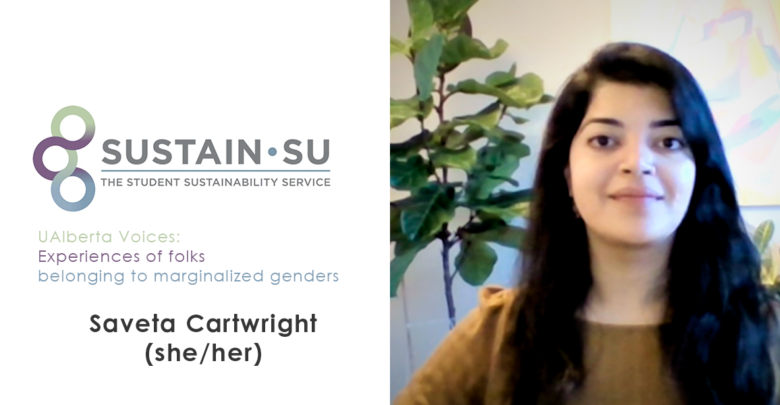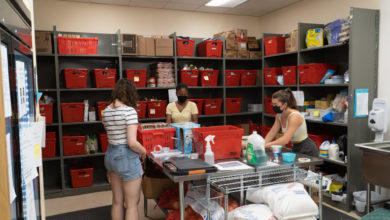Overcoming barriers and defining acceptance: a Q&A with Saveta Cartwright
 Pia Co
Pia CoThis guest column is written through a partnership with Sustain SU, a service provided by the University of Alberta Students’ Union. The interviews and articles have been conducted and written by Sustain SU ambassadors, and edited by The Gateway for publication.
This article is the fifth of a multi-part series named “UAlberta Voices: Experiences of Folks Belonging to Marginalized Genders“ that aims to highlight the experiences of students and community members belonging to marginalized genders in leadership positions within the University of Alberta campus and Edmonton community.
This is a question and answer (Q&A) session with Saveta Cartwright (she/her), on the topic of defining acceptance as a marginalized person in a leadership role.
This interview has been edited for brevity and clarity.
Q: Tell us about yourself and your background.
Saveta Cartwright [she/her]: My name is Saveta Cartwright, and my pronouns are she and her. I’ve had a career in construction and energy for the past six to seven years, and I was the manager for the estimating department before starting my masters in business arts (MBA). I managed a team of five personnel of various experience, backgrounds, and ages, which is uniquely challenging. Before that, I completed my undergraduate degree in mechanical engineering.
Q: Do you hold marginalized identities that make it difficult for you to navigate graduate studies?
Cartwright: Being a woman of colour, I’ve experienced racism and sexism at work throughout my career. At school, I find that the content that we’re being taught is not diverse. It’s through the lens of the quintessential white male leader. There’s a lot lacking in the realm of diversity, which is disappointing in a way. When I look around my classes, we students are diverse. We talk about having a 50 per cent male and female mix in classes, and hosting international students, but we’re being taught material that is not representative. Since we don’t see ourselves in the material being taught, does that mean we don’t have a place in leadership positions? Is it because society in general doesn’t have enough diverse examples of leaders and successful companies that could be taught in school? I find that hard to believe. There are women in leadership positions in leading corporations that we can speak of, but still I feel completely underrepresented in our studies.
Q: Do you feel the University of Alberta is doing enough to improve inclusivity and reduce marginalization towards students?
Cartwright: I am a first time U of A student, so my experience has been virtual, and I haven’t been exposed to the campus community at large. But, I can speak to my experience in classes. I appreciate the work the university is doing in inclusivity, and I think they’re heading in the right direction, but to me it feels like they’re a little behind the times. Maybe this is naïve, but I would want classroom content to represent the U of A population. If the population is half-female, half-male, why wouldn’t we have content being taught to us that reflects that? Similarly, [there should be content reflective] …of people of colour. This country has been built by immigrants, so why does it take so long to recognize them in leadership? Universities are at the cutting edge of change, innovation, and development. A lot of research and ideas start at the university, and if universities are behind in their diversity, what can we expect for society at large?
Q: Having worked in a management position for a small business, have you experienced discrimination based on your identity in the workplace?
Cartwright: Everyone has biases, we’re human. Humans tend to make snap judgements and have assumptions ingrained in us. But this is a diverse world, and people of all shapes and sizes need to learn to coexist. In the construction industry specifically, my experience is that there is still a very strong mentality of exclusion — [this might sound like] “if you look different than me, then you are not worthy”.
There are still a lot of preconceived notions of the role of women, let alone women of colour. I’ve walked through construction sites and I’ve been told by the people on site that I don’t belong there, or they assume I’m the “payroll girl,” which diminishes my position as an engineer. Women can do more than administrative jobs, women are more than those roles. There is a lot of re-education that needs to happen. I’ve studied about diversity initiatives in my courses, such as diversity quotas for hiring. I’ve experienced this in the workplace, too, with co-workers telling me I’m a diversity hire. I was hired for my capabilities and because I can do the job, or so I hope. Instead of demanding quotas for diversity in hiring practices, we should ask employers why they didn’t create a diverse workforce without mandated diversity. It forces them to do the internal work, and hopefully breaks down internal biases. A lot of times, people might feel like diversity is being shoved down their throats, so there needs to be introspection of one’s actions, instead of being told what to do with their hiring practices.
Another thing is exposure to diversity. There tends to be more diversity in entry level positions, but looking up the corporate ladder, it becomes less and less diverse. People in decision-making roles simply aren’t exposed to diversity enough. If I were to look at any of the senior leadership in the companies I’ve worked at, and their social interactions, I realize there is no diversity in their lives. They may have grown up in a time where they learned biases towards other communities and have ingrained mentalities that difference is bad. I question if enough exposure to diversity in leadership roles is happening in the workplace.
Q: What is your perspective on gender inequality?
Cartwright: I have to hope that meaningful change is on the horizon, so that I don’t give up! But if I’m being honest, I think inclusion is a long ways away. The racism and the sexism I face is not something that can be undone overnight. There are also ways in which I have privilege and have substantially fewer barriers than some others. If I have faced discrimination, I can only imagine how much harder it has been for others. What about those people who are incredibly qualified with skills, knowledge, and experience, but they may not be a native English speaker, and have a thick accent? In the industry I have worked in, there was no patience for that. Those individuals were talked over constantly. Ultimately, I think there is a lot more work to be done. For example, when people took to the streets to speak up about systemic racism in the BLM protests, many people were upset, and rejected that systemic racism even exists. The word “oversensitive” is used. So how do we move forward? I think we need to stop denying the facts of discrimination first.
Q: What is one strategy you use to overcome discrimation?
Cartwright: For me personally, I have had to pretend that it’s all in good humour, and try to brush it off and move on, because there is only so much you can do. You cannot let marginalization affect your personal or mental health. I would not have been able to do my job if I were to let it get to me. I think it is also important to talk about what management and bystanders can do. Give marginalized people some reassurance that they are supported in the workplace, and that if they must stand up for themselves, their job will not be threatened because of it. That is one of the major issues I have faced. I never felt supported in standing up to discriminatory comments. So, a lot of times, people just need some assurance.
Q: If you could send a message to your younger self or to other individuals in a similar situation, what would you say?
Cartwright: The current me is just trying to find a place where I don’t stick out, because that gets tiring. The younger me did the best she could, developing a thick skin through life experiences. Have some experiences left me a little bitter and jaded? Absolutely. I still have work I need to do on myself to reconcile with those events. But there is not much I could have done differently. Others could have done a lot more, though. One of the biggest challenges I’ve faced has been lack of support, lack of belonging, and lack of acceptance. I had to contort myself to fit in and to be accepted, such as acquiesce to conversations that were neither productive nor appropriate. However, I realized that no amount of conformance will result in acceptance. With that, perhaps I would tell my younger self to not try so hard to be accepted. I did a lot of harm to my mental and physical health doing things I felt I had to do to find a place. The biggest lesson I have learned is that I will not always be accepted, so I make decisions with that knowledge and with the hope that there is positive change on the horizon.
This guest column is written by Sustain SU volunteers through a partnership with Sustain SU, a service provided by the University of Alberta Students’ Union. To learn more about Sustain SU or to get involved, visit their website.




